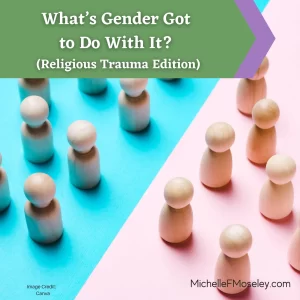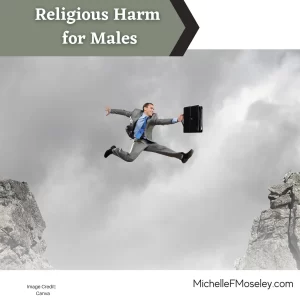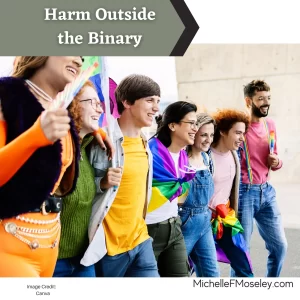Religious harm – injury that has a root in religious systems, beliefs, or practices – can take many forms. Some folks experience physical or sexual harm that is perpetrated by religious leaders or defended by religious beliefs. For some, the harm takes the form of spiritual abuse where words or actions are utilized in a spiritual context to manipulate or control them. There are times when these experiences lead to religious trauma – the lasting impacts of one’s nervous system being overwhelmed by the experience and not being able to return to a place of physical or emotional safety.
I have worked with and supported hundreds of individuals who have experienced some type of religious harm. I also have my own lived experience of spiritual abuse and religious trauma. One commonality that is frequently present is that the harm has a gender-based component.

What do I mean by that? In this context, gender-based harm means that some aspect of the harm experienced is tied to the group’s beliefs about gender. Beliefs about gender may include how people are expected to dress or behave. These beliefs may also include ideas about what a person’s life goals should be and what roles are open to them, both in the church or religious group and in the world.
Many high-control religious groups view gender as a binary. A binary view of gender is based on the idea that there are exactly 2 ways of existing in the world – male and female – and that those 2 ways of existing are distinct, and often opposite. When taken to the ultimate view of binary opposites, this creates gender norms that are harmful to everyone.
For the purposes of this post, I refer to a gender binary of male and female, as this is the most common view of gender that causes religious harm. However, I challenge you to consider if this view of gender as being one thing or another – fully different (even opposing) in traits and roles – makes sense. I know many folks who, regardless of their gender identity, exhibit traits ranging from assertiveness to tenderness to athleticism to being a gifted speaker. I also know many folks who have interests and talents that range from baking to organizing events to computer engineering, and that have no relation to their gender. So I ask, who does a strictly binary view of gender serve and support?
For the remainder of this post, I am focusing on the harm that can occur within religious groups that:
- Have a binary view of gender – there are men and there are women, and the two are innately and obviously different.
- Are rooted in patriarchy, defined as “a system in which men hold the power and women are largely excluded from it.”

Religious Harm for Females
Some of the ways that religious harm can occur for females include:
Forced Characteristics
Certain characteristics are often attributed to and/or expected of females within many religious settings. These frequently include characteristics such as:
- Submissive – Women are expected to yield their authority to men. This may refer to the way a female interacts with church leaders or her husband, or it may refer to an expectation that a woman yield her authority to all men. Without any authority over their own life and decisions, a woman in a high-control group is easily controlled, abused, and beaten down (emotionally, physically, or both). This woman often finds herself in a position of being trapped due to having been controlled by men and lacking access to resources or connection outside the group.
- Quiet – So many women (or folks who were socialized as female within religion) have been praised for being quiet or having a “quiet spirit.” This may sound benign, or even complimentary on the surface. However, these comments are often used as a way of reinforcing the idea that women should not speak or command attention in any way. Those women who do use their voice are frequently labeled as “aggressive” or “unkind”, and may even be pushed out of the group.
- Serving / Hospitality – Women are often encouraged, sometimes forced into, roles related to serving others or providing hospitality. In many high-control religious settings, you will find that women are the ones who are expected to be in the kitchen preparing food or the ones who are in charge of the details related to hosting events. Some women may enjoy these roles and desire to participate in this way. However, there are also some men who would enjoy and excel at these roles, and some women who do not.
- Attractive – Women within high-control religious groups are expected to be attractive, in the very specific way that the particular group defines attractiveness. This may be defined by the size of her body, the length of her hair, or the cut of her clothing. Regardless of the specifics, women are often referred to based on their appearance (often with little or no mention of other characteristics). I think of the many times I’ve heard a male leader refer to his “smokin’ hot wife” and I feel angry that this multifaceted individual has been shrunk down to only her appearance.
- Small – Women are expected to be small, both literally and figuratively. They are praised when their bodies are thin (while also being told it’s their fault if the men around them notice their bodies). They are also expected to maintain supportive, behind-the-scenes roles regardless of where their natural interests or talents may lie. How many intelligent, insightful women have never had their voice heard because they were too busy playing small in the support of others?
Forced Interests
A binary view of gender lends itself to restrictions around personal interests. In order to maintain the framework of two distinct genders, it is necessary to attribute certain interests to each. This also means that those with varied interests beyond what is prescribed for their gender often find themselves feeling like misfits.
Children. Hosting. Appearance. These are some of the interests that I have seen attributed and allowed for women in various religious contexts.
Women are expected to desire their own children, and to find fulfillment in caring for children. Many churches only allow women to care for children in the church nursery, while also assuming that all women want to take on this role.
Women are often tasked with hosting events. This can range from weekly small group meetings in their home to large-scale church or community-wide events. From planning to preparing food to serving to cleaning up, the tasks of being a host often fall solely on women. This leaves women who are gifted teachers or speakers and men who are passionate about hosting without opportunity to embrace those interests.
Women are expected to be aware of and concerned about appearance at all times; yet without ever seeming to be aware of appearance for fear of being seen as vain. Most high-control religious groups have guidelines around how women should dress and what parts of the body a woman must cover. Women are directed to look attractive, but not too attractive lest they be the reason a man lusts (or worse).
These restricted interests that are forced upon women solely based on gender leave a lot of people feeling excluded and mean that communities miss out on the variety of human expression and passion.
Restricted View of Sex
Many high-control religions include a very rigid view of sex. Lots of folks who grew up in the 90s or early 2000s experienced purity culture, the movement within evangelical Christianity that emphasizes sexual abstinence, modest dress, and traditional gender roles. I have also heard of groups that refer to these teachings as the “law of chastity” or as a “Biblical sexual ethic.”
Regardless of the terminology, this restricted view of sex generally has a hierarchical view of what is acceptable or appropriate regarding sexual behavior or activity. The only acceptable sexual activity within these constructs is generally intercourse between one man and one woman within the confines of heterosexual marriage. There may be restrictions around other types of sexual activity within the marriage relationship, or even when individuals are allowed to engage in sexual activity.
Other common restrictions related to sex, particularly for women, include:
- Dressing in a way that covers your body and does not cause men to see you as a sexual being. This puts the responsibility on women for the thoughts and actions of others, namely men.
- Not learning about your body, reproductive system, or what you find pleasurable. There is generally a lack of information and education available about bodies within these groups.
- Masturbation is viewed as “dirty”, “sinful”, or even as “cheating on your future spouse.” This prevents safe sexual exploration of one’s body, and frequently leads to folks experiencing intense shame for a normal human activity.
- Messages that your body does not belong to you. Many women have repeatedly been told that their body is for their husband. The message is that a woman must preserve (i.e. not engage in any sexually related activity) herself for marriage, and then must always be available to her husband for sexual activity once married. This completely leaves out those who do not get married, and also creates an environment where marital rape is acceptable.
- Being told that you are “chewed up gum”, “old trash”, or a “dead flower” if you have explored your sexuality in any way outside of heterosexual marriage. Yes, these are very real examples that were (and sometimes still are) taught to thousands of young women.
Lack of Autonomy
Autonomy refers to an individual’s right to govern themself – to make their own decisions, acknowledge their own values and preferences, and pursue their own interests and dreams.
High-control groups, by their very nature, limit the autonomy of those involved. For women in groups with a patriarchal framework and binary view of gender, autonomy can be non-existent. I have worked with many women who experienced harm within these types of groups. They frequently find themselves uncertain about who they are because they were never allowed to form a sense of self or explore their own identity. These women may struggle to make decisions because they have always been told to defer to men or to leaders. They are faced with discovering their actual self, and learning how to practice self-governing autonomy.

Religious Harm for Males
Women aren’t the only ones who experience harm within these religious systems. Some of the ways that men may be harmed include:
Forced Characteristics
A binary view of gender means that certain characteristics are seen as “masculine” or “manly” and those are prescribed for men. Some of the characteristics that are forced upon men include:
- Fearless Leader. Men are expected to take on leadership roles in their homes, jobs, and church. These roles are generally in areas that place men in front of people and involve vocal leadership. Many men feel pressure to exude a sense of fearlessness in these roles, not having freedom to acknowledge any hesitancy or anxiety that might be present. This forced way of being doesn’t take into consideration the men who may have no desire to lead in this way, or who may deal with mental health concerns that make fear or anxiety a very real part of their lives.
- Outspoken. In high-control religious systems, men are often expected to be the ones who speak up and speak out. Men are seen as the people capable of learning and understanding information, and the ones who are supposed to outwardly share that information with others. Men who may be more quiet by nature or who may prefer to learn from others can be left feeling out of place or “wrong” within these structures.
- Take Charge. Following the same theme, men are expected to take charge of situations. They feel the pressure of gathering information and making the right decision for their family or their career. In systems that lean on ideas of male headship or leadership and female submission, a man may not feel that he has freedom to even consult with some of the closest people in his life because they are women. He may feel isolated and alone under the pressure to take charge of things in every area of his life.
- Unemotional. Many men have been taught some version of “boys don’t cry” or “suck it up.” They may have also been reprimanded for displays of joy that didn’t fit within the confines of what is seen as acceptable. Yet, men, just like every human individual, experience a wide range of emotions and are capable of a variety of emotional expressions. The pressure to not express sadness or any emotion that may be seen as “weakness” often leads to angry outbursts. Those outbursts may be expressed externally in physical acts of violence toward objects or people. Anger may also be turned internally, leading to an experience of shame and possibly even depression. Many men find some solace in being able to express emotions in the realm of sports, but what about those for whom sports are not an interest?
Forced Interests
High-control religious systems frequently have a restricted view of what hobbies and interests are acceptable for someone based on their gender. Keeping these guidelines in place can be one way of maintaining a binary view of gender. Men who don’t find themselves enjoying these interests can feel isolated from the group, and may even be referred to with gender-related slurs.
Sports. Hunting. Reading theological texts. These are some of the common interests that I have seen be viewed as appropriate for men in various high-control contexts.
Sports often provide a way for men to gather together, experience a range of emotions, and bond over shared affection for (or disdain of) a particular team. Sports can also be a way for men to remain active and relive their own “glory days” of athletic ability. Yet, there are men who couldn’t care less about sports, or who enjoy a sport that is more obscure and doesn’t fit within the prescribed sports-related interest. There are also folks who are not men and who happen to enjoy sports and long to be able to connect with others in this way.
Now, hunting may be a bit more region-specific, but I’d venture to guess that every area has something that fits into this category. I’ve been in and known of lots of religious groups in rural (and even suburban) areas of North Carolina that honor hunting as a part of the assumed natural interests for men. This may include planning events around hunting season, men showing up to services in their camo either before or after a hunting outing, and even planning “For Men Only” events that are focused on making parallels between God and being a hunter. Whatever the specific interest is, this hyper focus on a very specific interest and how it makes someone a better man presents a problematic view of both gender and God.
Reading theological texts, and the expectation for ongoing discussions and debates about them, are another interest I have seen forced upon men in several religious contexts. The specific texts or authors who are revered and discussed varies, but the expectation is that, as a man, an individual is regularly engaging with these texts, and coming to the “correct” conclusions in order to have drawn out conversations with others about the topics addressed. This kind of expected interest overlooks those who struggle with reading or prefer to learn in other ways, those for whom faith focuses more on loving others than on some author’s thoughts, and so many others.
These restricted interests are forced upon men based solely on a binary view of gender, leaving many folks feeling disconnected or inherently wrong because they don’t enjoy these things.
Restricted View of Sex
The rigid view of sex previously mentioned impacts men as well. Common aspects of a restricted view of sex that impact men include:
- Being taught that any thought related to sex or any attraction to another person is sinful. This can lead to feelings of shame for typical development or for the harmless noticing of another person as attractive.
- Masturbation being seen as “dirty”, “shameful”, or “sinful.” Rather than allowing an individual to develop a healthy sense of self and sexuality, this teaches shame and secrecy.
- Men learning that women are to be held responsible any time a man notices a woman’s appearance, has lustful or desirous thoughts, or commits an act of sexual assault. This does not allow men to be fully responsible individuals, and creates a system of blaming and shaming women for existing in the world.
- The expectation that, if a man marries a woman, she will always be available to him for sexual activity whenever he pleases. This teaching denies a woman’s humanity and autonomy, leaves no room for consensual pleasure, teaches men they are unable to control their sexual desires, and creates a culture where marital rape is a regular (and accepted) experience.
Fear of Failure
Failure is a part of living life. Every individual who has mastered walking or feeding themself experienced many instances of failure along the path of learning. Yet, a rigid gender binary tells men that they are not allowed to fail. They are not allowed to have a fully human experience.
Men in high-control religious systems are expected to be knowledgeable, in control leaders who display no fear. But fear comes because it’s a part of life. Then, those same men are left alone with their distress and worry. They aren’t allowed to share their fear with someone else, to have support or someone to share the burden. Often, these men can’t even seek input or guidance from others due to the pressure to appear competent and fearless at all times. This system creates a dynamic where men are not allowed to have the experience of being fully human because they are confined by this binary thinking.

Harm Outside the Binary
I have focused on a binary view of gender – female and male – in this post because most high-control religious groups view gender in this way. Either / Or. This / That. No room for variation, nuance, or shades of gray.
But what about those who exist outside this gender binary? This includes those who are transgender, nonbinary, and genderqueer. This also includes those who are male or female, yet who don’t fall within the strictly prescribed binary described above.
Here are some of the ways rigid views of gender can harm those outside the binary:
- Feeling misunderstood everywhere. Those who don’t fit neatly within the prescribed characteristics or interests of the gender binary are often left feeling as though they don’t fit in anywhere within their religious group. They may work to create their own place in the system, perhaps as a musician or youth volunteer, or they may sit quietly on the sidelines aware of their own isolation.
- Surrounded by messages of sin, guilt, shame, and fear. Religious systems that hold their view of gender tightly are the same places where there are frequent messages focused on how sinful or wrong it is to not fall in line with these gender roles and restrictions. This may include being told you are not truly committed to God because you are not taking a leadership role as a man or you are not having children as a woman. Messages may also be focused on attempting to shame you into fitting a certain mold, or instilling fear of eternity in you as a way of causing you to fall in line.
- No awareness of options outside the binary. For those who are very involved in these high-control religious systems, they may have no awareness of any options outside the strict gender roles and expectations taught within the group. This includes the areas of sexuality and gender identity. It also includes things such as what vocational options are available (not based on gender) and various ways to engage in genuine interests that may be outside the rigid gender expectations of the group.
- Lack of opportunities for typical development – cognitively, sexually/relationally, morally. Human development from a child into an adult involves developing critical thinking skills, learning to make wise decisions, exploring the types of relationships you enjoy and learning how to interact with others effectively, and figuring out your own personal morals and values that will guide your life. High-control religion doesn’t allow for these types of typical developmental tasks within the system. The further a person’s thought processes, values, and relational desires fall outside the structure of the system, the fewer the opportunities for them to explore and develop on a typical timeline.
How Can I Get Support?
Does any of this resonate with you? What experiences have you had that were shaped by a binary view of gender within a high-control religious system? I know I could list quite a few from my own experiences in these systems.
I specialize in providing support for folks who have experienced harm within religious systems. This may include spiritual abuse, religious trauma, overall impacts of being in a high-control environment, or a multitude of other types of harm that have a religious component. I view my role as helping you understand your experience and figure out how to move forward in the way that makes the most sense for you personally.
I offer both individual and group therapy via telehealth to folks who are located in North Carolina. You can learn more about those options here. Please contact me if you’re interested in scheduling a free, 15-minute consultation to see if we might be a good fit for working together.
Additionally, if you’re interested in possibly working together, but are located outside NC, please take a moment to let me know. I’m working on some options to make these types of services more accessible to folks, and would love to keep you in the loop.
Michelle F. Moseley is a Licensed Mental Health Counselor in NC. She believes ALL people deserve respect, compassion, and access to mental and physical healthcare. Michelle specializes in working with survivors of religious trauma and with those who have body image concerns, finding there is frequent overlap in these areas. You can learn more about Michelle by visiting her website at MichelleFMoseley.com or following her on Instagram – @therapy_with_michelle
Sign-up for Michelle’s Monthly Email Newsletter to make sure you never miss a blog post
